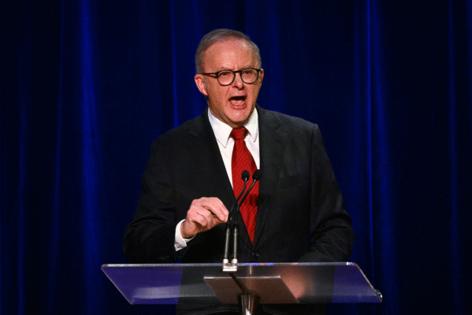Australia evades US tensions to seek closer China trade ties
Published in News & Features
The prime minister of Australia, a longtime U.S. security partner in Asia, sought to focus his trip to China this week on business and trade opportunities, sidestepping thornier issues around U.S.-China competition such as Taiwan or Beijing’s military expansion.
Since taking office just over three years ago, Anthony Albanese has repaired his country’s relationship with China, Australia’s No. 1 export market, after suffering Beijing’s punitive tariffs and other restrictions during the pandemic.
Now, however, President Donald Trump’s renewed trade war between the U.S. and China risks again destabilizing those ties, as they do for Japan, South Korea, the Philippines and others in the region who look to Washington for security but to China for trade.
Premier Li Qiang noted as much in his opening remarks to Albanese during the Australia-China annual leaders’ meeting in Beijing late Tuesday. Li said the world economy is experiencing “growing instability and uncertainty” and that “all countries are faced with new challenges,” without specifically mentioning Trump, the U.S. or tariffs.
In a joint statement, China and Australia said they agreed to enhance exchanges and cooperation, uphold their respective national interests and navigate differences wisely.
Speaking to reporters after he met with President Xi Jinping earlier Tuesday, Albanese stressed the economic significance of the relationship between the two countries.
“Given that China is overwhelmingly, by far, the largest trading partner that Australia has, it is very much in the interests of Australian jobs and the Australian economy to have a positive and constructive relationship,” he said.
Xi was equally enthusiastic: “The China-Australia relationship has risen from the setbacks and turned around, bringing tangible benefits to the Chinese and Australian peoples,” he said, obliquely referring to the tensions before 2022.
The leaders seemingly both avoided any tricky security-related issues, including the potential forced sale of the port of Darwin by its Chinese owner, given its proximity to where U.S. Marines exercise. Albanese said the issue didn’t come up in his talks with Xi.
Neither, he said, did complaints about Australia’s foreign investment regime, which has blocked a number of proposed purchases by Chinese firms, nor reports that the U.S. has pressured Canberra about its role in any potential war over Taiwan.
On Taiwan, Albanese said he reaffirmed his nation’s commitment to the “status quo” — support for the island’s de facto autonomy without endorsing formal independence and maintaining recognition of the One China policy. His remarks highlight Australia’s opposition to any unilateral move, especially by force, to alter the cross-strait balance.
In a separate statement, Premier Li told a China-Australia CEO Roundtable that he hoped Australia would treat Chinese enterprises fairly and address issues in market access and investment reviews.
Positive Momentum
Chinese state media has been positive about the trip, with an editorial Monday in the China Daily, the main Communist Party mouthpiece in English, saying that it highlights “Australia’s commitment to deepening ties and fostering stability amid the uncertain global landscape.”
“Against the backdrop of rising tensions between the United States and many countries because of the U.S. administration’s recent threat to levy higher tariffs” his visit “shows that the Australian side has a clearer judgment and understanding of China” than the previous government of former Prime Minister Scott Morrison, the editorial said.
“The progress made in their economic and trade cooperation in the past two years has benefited the people of both countries, and provided a counterweight amid the rampancy of unilateralism and protectionism,” it said.
Albanese took pains to argue that his government wasn’t looking to China to make up for the changes to U.S. trade policy under Trump.
“Trade with the U.S. is important, but is less than 5%” of what the country sells, he said. “What Australia is doing is engaging not just with China, but we engage as well with our partners around the world and we increasingly want to see a diversification of our trade.”
Albanese heads next to Chengdu on his six-day trip, which comes on the heels of visits by a number of Australian officials. Reserve Bank Deputy Governor Andrew Hauser traveled there in April, followed by Governor Michele Bullock in May.
The two nations are set to start a review of their Free Trade Agreement, which was signed a decade ago, Albanese also said Tuesday. China’s Ambassador Xiao Qian in an editorial last week called for a review “with a more open attitude and higher standard.”
While China bought almost $62 billion of Australian goods in the first half of this year, managing the relationship is complicated by Beijing’s increased assertiveness in the Asia-Pacific. In February, it conducted live-fire naval drills in the Tasman Sea, near Australia and New Zealand.
Albanese said at the time that he was concerned by the lack of notice from Beijing over the drills, which he also said were within the bounds of international law. He said Tuesday that he sought assurances from Xi about being better informed in the future. He didn’t clarify if he received them.
_____
(With assistance from Josh Xiao, Olivia Tam and Bingyan Wang.)
©2025 Bloomberg L.P. Visit bloomberg.com. Distributed by Tribune Content Agency, LLC.







Comments